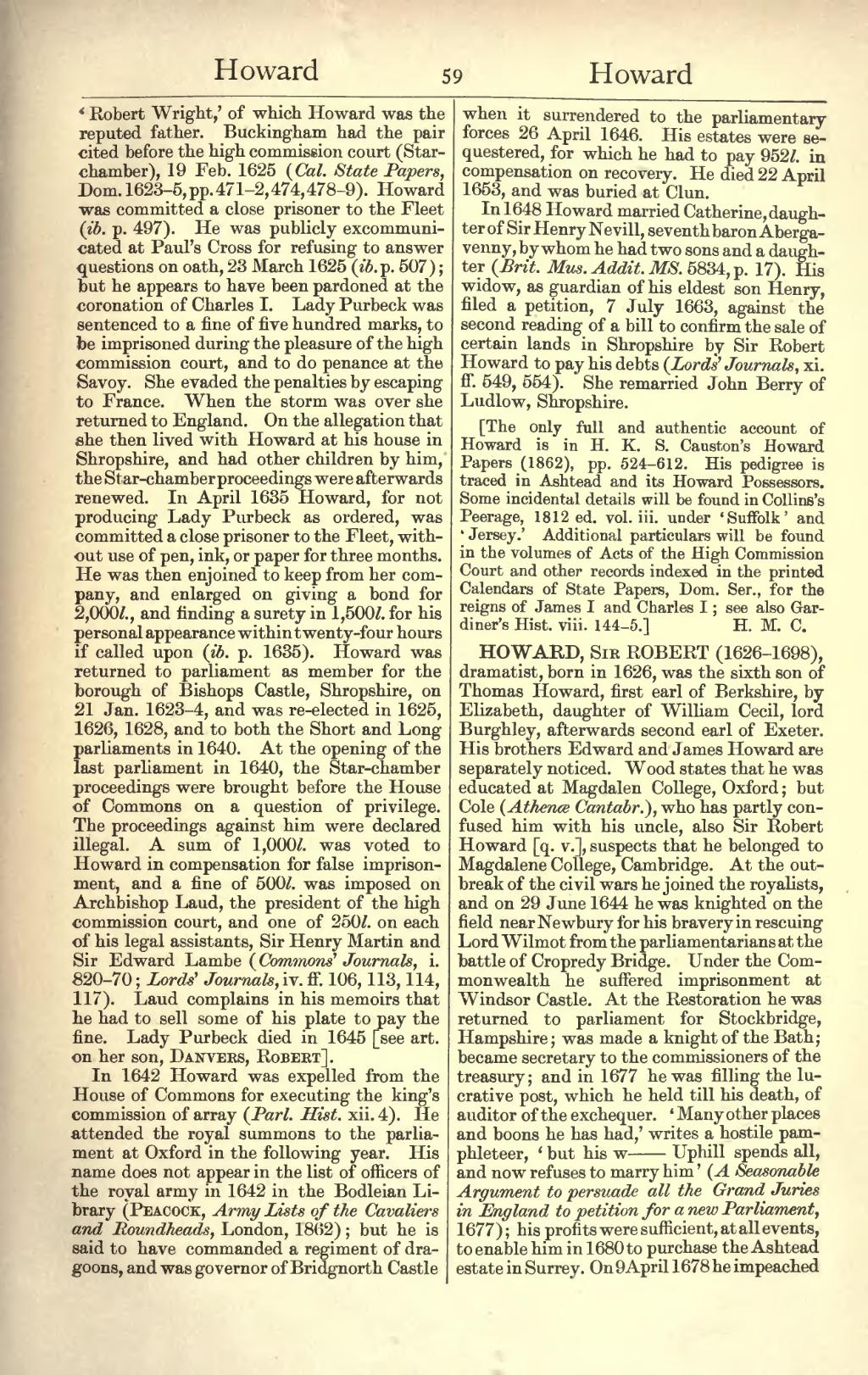'Robert Wright,' of which Howard was the reputed father. Buckingham had the pair cited before the high commission court (Star-chamber), 19 Feb. 1625 (Cal. State Papers, Dom. 1623-5, pp. 471-2, 474, 478-9). Howard was committed a close prisoner to the Fleet (ib. p. 497). He was publicly excommunicated at Paul's Cross for refusing to answer questions on oath, 23 March 1625 (ib. p. 507); but he appears to have been pardoned at the coronation of Charles I. Lady Purbeck was sentenced to a fine of five hundred marks, to be imprisoned during the pleasure of the high commission court, and to do penance at the Savoy. She evaded the penalties by escaping to France. When the storm was over she returned to England. On the allegation that she then lived with Howard at his house in Shropshire, and had other children by him, the Star-chamber proceedings were afterwards renewed. In April 1635 Howard, for not producing Lady Purbeck as ordered, was committed a close prisoner to the Fleet, without use of pen, ink, or paper for three months. He was then enjoined to keep from her company, and enlarged on giving a bond for 2,000l, and finding a surety in 1,500l. for his personal appearance within twenty-four hours if called upon (ib. p. 1635). Howard was returned to parliament as member for the borough of Bishops Castle, Shropshire, on 21 Jan. 1623-4, and was re-elected in 1625, 1626, 1628, and to both the Short and Long parliaments in 1640. At the opening of the last parliament in 1640, the Star-chamber proceedings were brought before the House of Commons on a question of privilege. The proceedings against him were declared illegal. A sum of 1,000l. was voted to Howard in compensation for false imprisonment, and a fine of 500l. was imposed on Archbishop Laud, the president of the high commission court, and one of 250l. on each of his legal assistants, Sir Henry Martin and Sir Edward Lambe (Commons' Journals, i. 820-70; Lords' Journals, iv. ff. 106, 113, 114, 117). Laud complains in his memoirs that he had to sell some of his plate to pay the fine. Lady Purbeck died in 1645 [see art. on her son, Danvers, Robert].
In 1642 Howard was expelled from the House of Commons for executing the king's commission of array (Parl. Hist. xii. 4). He attended the royal summons to the parliament at Oxford in the following year. His name does not appear in the list of officers of the royal army in 1642 in the Bodleian Library (Peacock, Army Lists of the Cavaliers and Roundheads, London, 1862); but he is said to have commanded a regiment of dragoons, and was governor of Bridgnorth Castle when it surrendered to the parliamentary forces 26 April 1646. His estates were sequestered, for which he had to pay 952l. in compensation on recovery. He died 22 April 1653, and was buried at Clun.
In 1648 Howard married Catherine, daughter of Sir Henry Nevill, seventh baron Abergavenny, by whom he had two sons and a daughter (Brit. Mus. Addit. MS. 5834, p. 17). His widow, as guardian of his eldest son Henry, filed a petition, 7 July 1663, against the second reading of a bill to confirm the sale of certain lands in Shropshire by Sir Robert Howard to pay his debts (Lords' Journals, xi. ff. 549, 554). She remarried John Berry of Ludlow, Shropshire.
[The only full and authentic account of Howard is in H. K. S. Causton's Howard Papers (1862), pp. 524-612. His pedigree is traced in Ashtead and its Howard Possessors. Some incidental details will be found in Collins's Peerage, 1812 ed. vol. iii. under 'Suffolk' and 'Jersey.' Additional particulars will be found in the volumes of Acts of the High Commission Court and other records indexed in the printed Calendars of State Papers, Dom. Ser., for the reigns of James I and Charles I; see also Gardiner's Hist. viii. 144-5.]
HOWARD, Sir ROBERT (1626–1698), dramatist, born in 1626, was the sixth son of Thomas Howard, first earl of Berkshire, by Elizabeth, daughter of William Cecil, lord Burghley, afterwards second earl of Exeter. His brothers Edward and James Howard are separately noticed. Wood states that he was educated at Magdalen College, Oxford; but Cole (Athenæ Cantabr.}, who has partly confused him with his uncle, also Sir Robert Howard [q.v.], suspects that he belonged to Magdalene College, Cambridge. At the outbreak of the civil wars he joined the royalists, and on 29 June 1644 he was knighted on the field near Newbury for his bravery in rescuing Lord Wilmot from the parliamentarians at the battle of Cropredy Bridge. Under the Commonwealth he suffered imprisonment at Windsor Castle. At the Restoration he was returned to parliament for Stockbridge, Hampshire; was made a knight of the Bath; became secretary to the commissioners of the treasury; and in 1677 he was filling the lucrative post, which he held till his death, of auditor of the exchequer. 'Many other places and boons he has had,' writes a hostile pamphleteer, 'but his w—— Uphill spends all, and now refuses to marry him' (A Seasonable Argument to persuade all the Grand Juries in England to petition for a new Parliament, 1677); his profits were sufficient, at all events, to enable him in 1680 to purchase the Ashtead estate in Surrey. On 9 April 1678 he impeached

